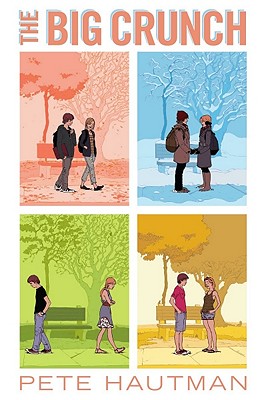 I love YA romance, but I am extremely picky.
I love YA romance, but I am extremely picky.
- I don’t like a lot of gratuitous descriptions of the characters’ hotness.
- I don’t like a lot of completely obvious foreshadowing – it’s a romance, we know you are gonna hook up no matter how star-crossed your love may be.
- I don’t like love that comes on too quickly, or can be easily confused with that of an obsessive stalker (sorry, Twilight)
I like romance, but I’m a smart girl. I don’t fall for silly romantic ploys, in real life or in fiction.
Pete Hautman’s The Big Crunch is probably the smartest romance I’ve read in quite some time. Apparently I am not alone in this thinking, as it was given a Los Angeles Time Book Award nod a few weeks ago, standing up against former Printz winning author Libba Bray, critical darling Life: An Exploded Diagram, Printz Honor The Scorpio Races, and the immensely popular Patrick Ness. The Big Crunch doesn’t feel out of place in this bunch – he did win a freaking National Book Award – but it is of certainly quieter than the LA time nominees. Contemporary realism that doesn’t scream LITERARY. Lots of pink on the cover. Romance.
It’s quiet, but yes: it’s smart. Very smart.
The Big Crunch is the story of two teens and their completely typical love affair. June and Wes remind me that teen romance is rarely of the Romeo & Juliet, the Edward & Bella, or even the Sarah Dessen variety. Teen romance is not often foreshadowed, not always quick to bloom, not always logical. Teen relationships are weird.
June is new at school, but she’s used to it. Her dad’s job has her at multiple schools every school year. She knows how to fit in enough to get what she needs – a group to sit with in the cafeteria and maybe someone to kiss, if she feels like it. Wes broke up with his long-term girlfriend over the summer and he’s not sure why he did it, especially now that she’s moved on and it’s stressing him out. It’s not love at first sight for Wes & June – their social circles occasionally collide, they meet by chance walking home, and eventually, these tiny moments add up to a love.
But even then, things are not easy. Some factors that challenge their relationship are beyond their control – parents, friends, timing – but Hautman also doesn’t hold back from exposing, through close third-person narration for both Wes and June, the many tiny ways that people in love can betray one another. The pettiness. The exhaustion of being together and the tendency to blame the other party.
People are not always nice. All endings are not happy. Love is awful sometimes, and this is the kind of love that can shapes our future relationships sometimes, shape who we become.
I find that much more compelling than anything perfect.